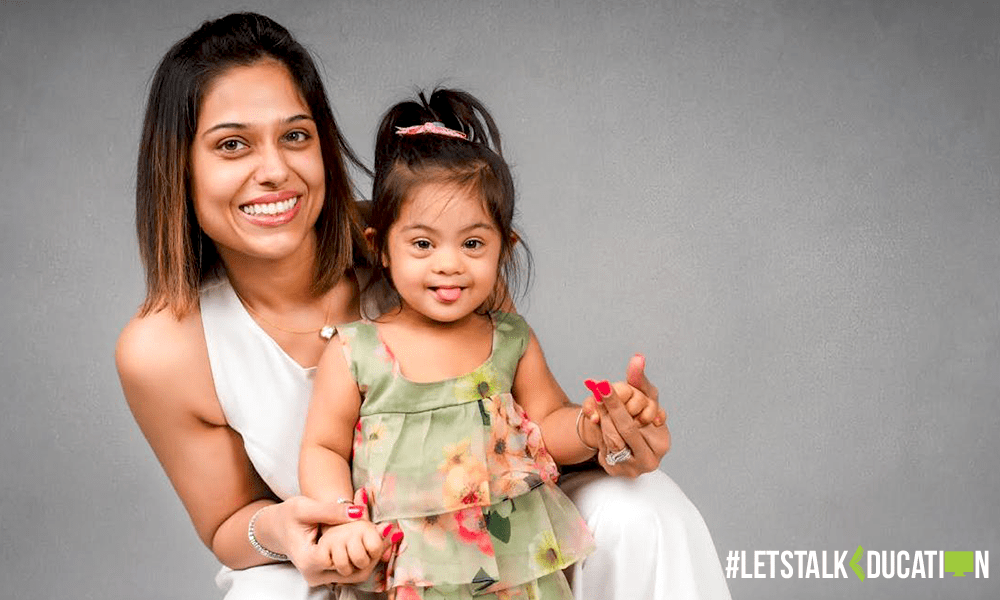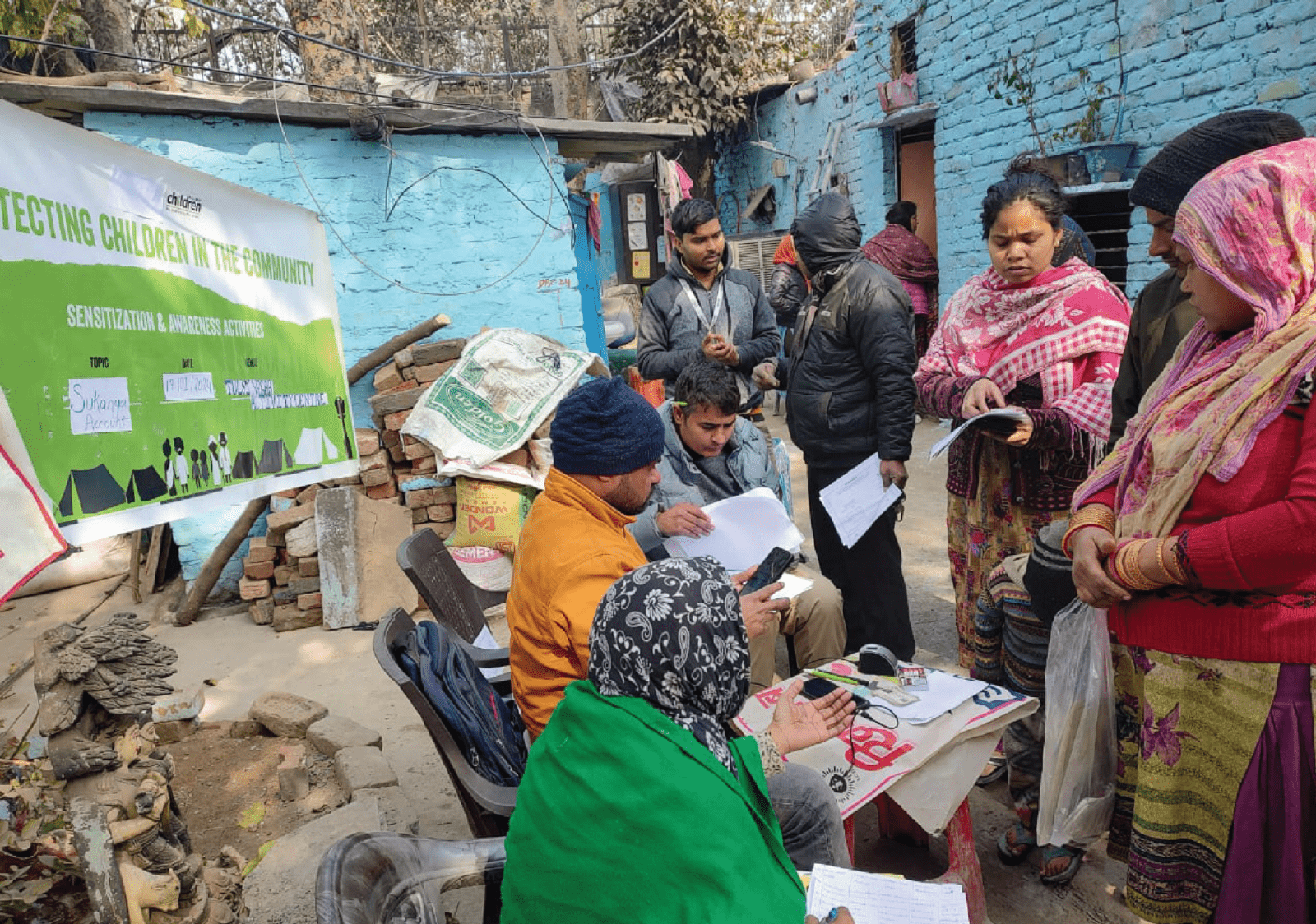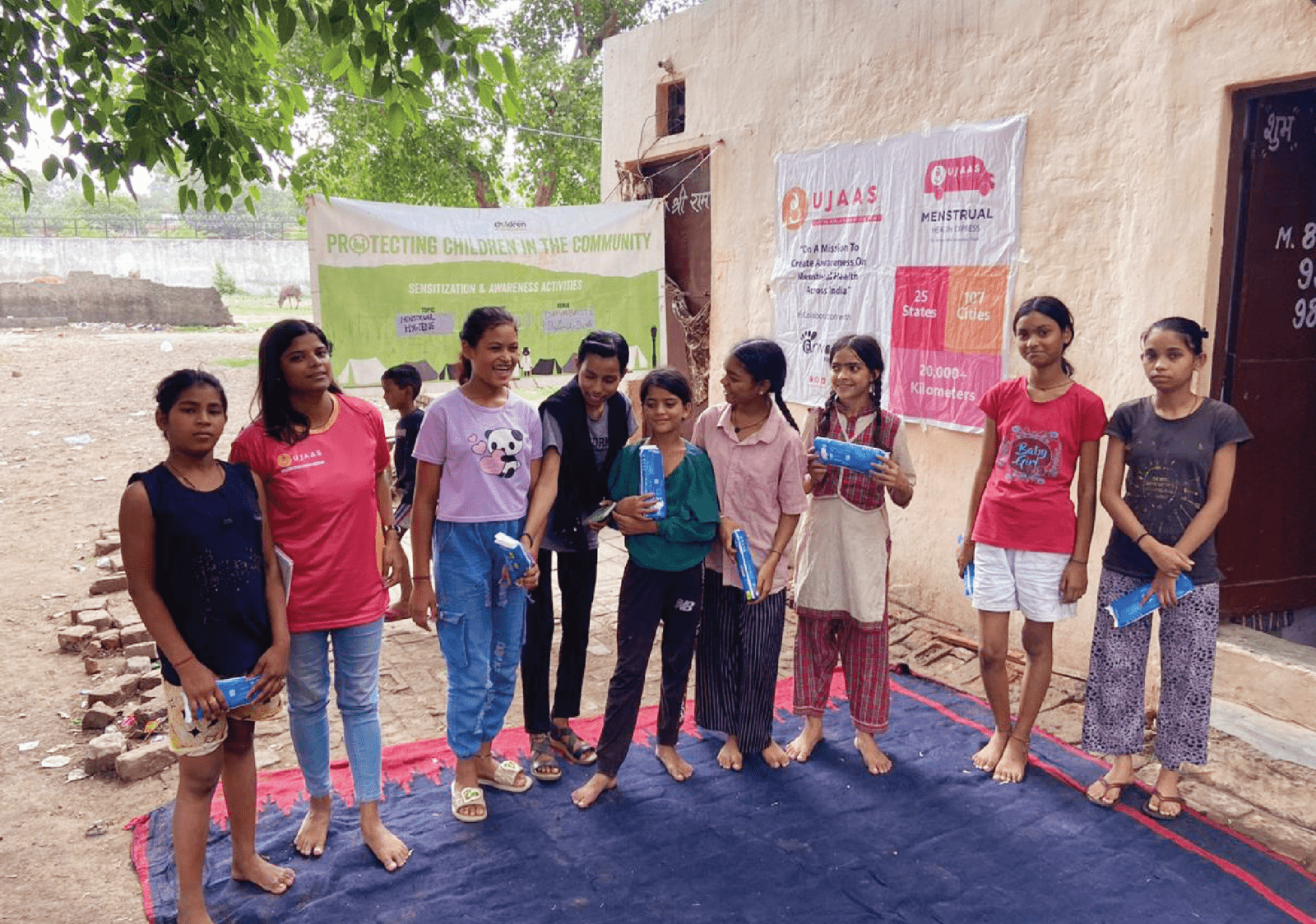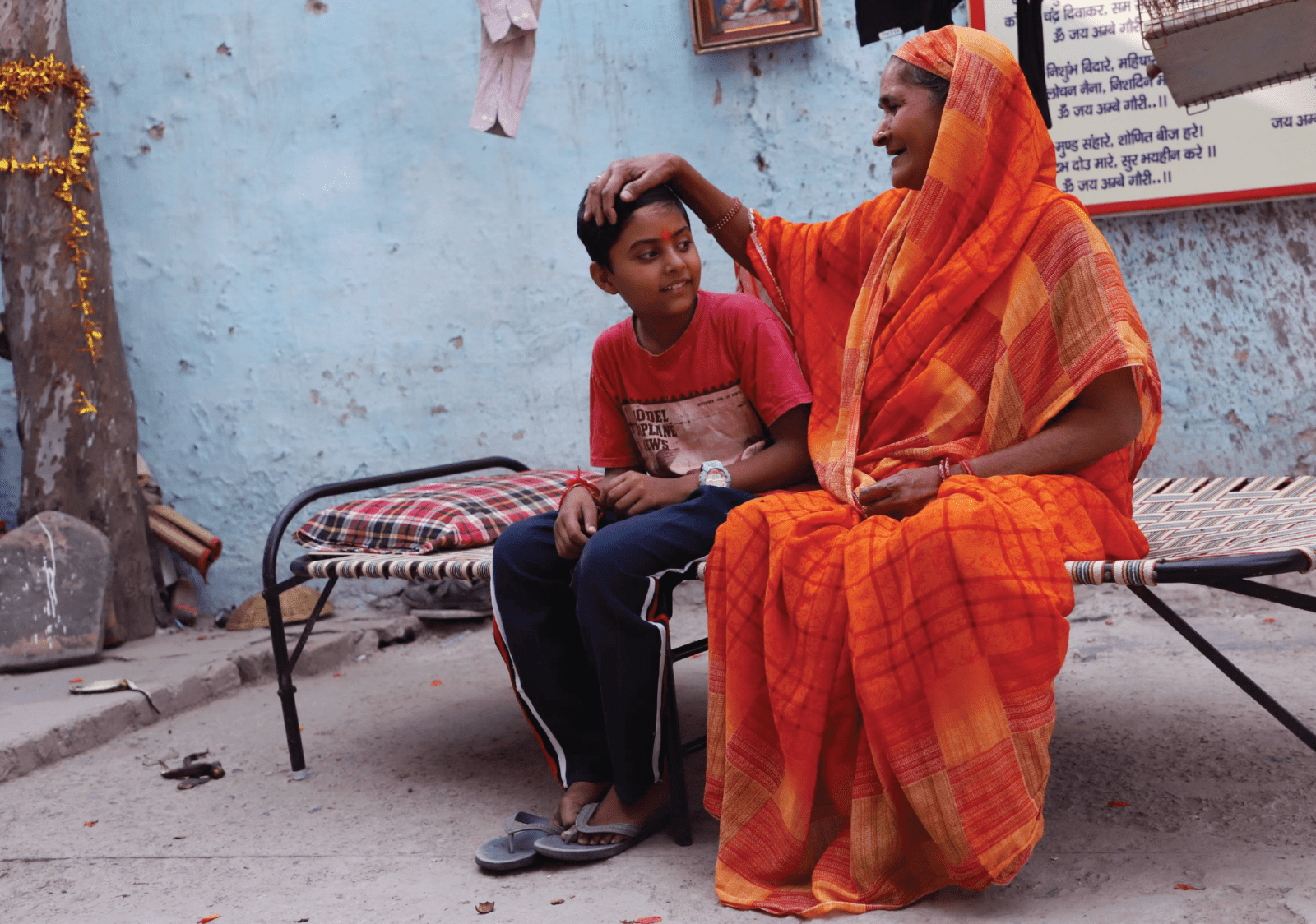You probably know Pooja Khanna from her Instagram profile that has been changing the narrative on children with special needs, ever since she had Norah. But in the last week, we got to know her a little better. In a candid conversation with Divya Kabadi, Pooja describes her journey as a parent during lockdown, moving online for many of Norah’s learning experiences, appreciating the role of teachers, grandparents and others in helping children cope, sharing her views on the new education policy and most importantly learning that children are adaptive and resilient in the most trying times.
Read on to take a page out of Pooja & Norah’s book, to really understand children and help them continue to learn no matter what the circumstances.
Q) What were your first thoughts when the lockdown was announced (in context to Norah)?
Ans: Well honestly, I didn’t take it too seriously. I thought to myself how bad could it be? It won’t possibly go on for too long. I didn’t panic. In fact, I was looking forward to the break. I looked at it as some time to take a breather and simply wind down a little. Gradually, as the lockdown kept getting extended, the realization set in, and we began to look for other alternatives. As for Norah, fortunately, her school took prompt action in the wake of the pandemic and had started e-schooling much before the lockdown was announced. So, we had already begun carrying out the activities planned by her school, with whatever was available then. We had limited supplies for all her activities; it was almost like trying to make the best out of whatever was available. Initially, it was exciting to think of what we could come up with and where we could be more creative. We went with the flow, but soon realised that we needed to help Norah with her needs too, through therapy.
We wanted to start occupational therapy for Norah, but we were apprehensive about it because that would mean increased screen time for her. We were only just beginning to get comfortable with her school going online, but for Norah it was all new; she went from no screen time to a lot of screen time. Her eyes used to water too, initially. But we had to adapt and make do with what was available, so we began her therapy online.
I had several questions going on in my mind while all this was happening. Is it overstimulation for her? What will Norah make of this situation? Do I have to explain what is happening? How should I explain it to a 2.5 year old? However, despite all my questions and apprehensions, we adapted well, and Norah adapted well too. She was doing fine.We then plunged into online speech therapy, and gradually moved to downloading a few apps too, which were recommended by her school. In turn, I got the opportunity to learn along with Norah, which aided me to teach her more efficiently.
To sum it up, the last four months have been amazing for us. We were safe at home and Norah was able to smoothly continue with her learning and growing. In no way has the lockdown hampered her education, or her cognition, or her abilities.
Q) What were the immediate changes that took place in Norah’s daily routine due to the lockdown and how did you ease her into those changes?
Ans: The immediate change was not stepping out of the house! Her pre-lockdown routine was going to school in the morning, going for therapy, getting back home in the afternoon for lunch, taking a nap and then in the evenings going to the park or the mall. Essentially, we would be out of the house for most part of our day. We were only home for her lunch and rest; majority of her time was spent outdoors around people. So, not stepping out of the house at all was the biggest change.I must add here that we have always made sure that she is around people, doesn’t matter whether she knows them or not, because we believe that we learn a lot from being around people. That being cut-off completely, I was worried that she would forget being comfortable around people, or that she is a people person. So to make sure that doesn’t happen, I kept her in touch with her grandparents, or our neighbours, essentially, we kept her social outings alive in some way or the other.
Q) What were the initial steps that you took for your daughter, to ensure regular learning?
Ans: Honestly, I didn’t have to do much because Norah adapted to everything so seamlessly. It was so synchronized between both of us that all my worries died down, seeing her ease into all the changes herself. So, I didn’t really have any plans; it all went along organically. Yes, we had our days. On good days, we would manage to do a lot of activities and then on other days, if I was very tired, we simply bummed around and did whatever she wanted to do. I took the lead on some days, and she took the lead on other days. Either way, both of us were having fun and that’s what matters.
Q) How has Norah’s lockdown learning journey been like so far, and your lockdown teaching journey been like as a parent? What are some of the challenges that you faced?
Ans: I think her lockdown journey has been great and my lockdown journey, because of her, has been full of learning rather than teaching. I learnt things from her that I never expected. For instance, she learnt so much despite of all the limitations put before her. Before the lockdown she wasn’t talking much, but during the lockdown she began using more words, using a lot more signs, and being more interactive. All of these great things happened while I was worried about her being cut-off from the world.
One of my most vital learning was that we tend to place a lot of undue importance on external factors, whereas all the kids need is a little bit of stimulation and they are going to bloom no matter what. And at the end of the day, they are kids! They are not going to remember much about this time, at least not as much as we will, so we should worry less about the future implications of these times.
Norah seems to be having a great time. She has adapted to this situation wonderfully and she will adapt to the next ‘way of life’ too. It is a reminder that kids are super adaptive, something that we should learn from them. As for the challenges, I didn’t face any challenge in context to Norah; rather, the challenge was to keep my own thoughts in check. It was more emotionally challenging for me. But when things around you are in order, you will automatically feel calmer. Had situations around me been chaotic or had Norah been irritable or overwhelmed, it would become all the more challenging for me. Fortunately, I had my support systems in place.
Vivek and I are both pretty hands on. On days when I would be feeling overwhelmed, or I simply wanted to take a break, I would tell him honestly that I don’t feel like doing anything now, ‘I am done for today’ is what I would say, and he would understand and simply take over from me, and then I had my parents too. Of course there were days when all of us would feel overwhelmed, even though we were all together. I didn’t want my parents to leave, but I didn’t want them to get in my way when I was telling Norah something. Eventually though, the realization dawned on me that I do need to calm down and that each parent wants the best for their child. My parents wanted the best for me and for Norah, but I just wanted the best for her. So, when they would ask me to take a break, I wouldn’t, and soon I’d be exhausted, which promptly followed by ‘see, we told you to take a break!’
Another major learning was to take a break when people ask you to take a break, particularly when your parents ask, because they can always see it coming before you do.
Q) What role did her school play in ensuring she was spending time constructively at home? To what extent did that assist you?
Ans: Norah goes to Toddler’s Den and right from the beginning they have been extremely supportive. To give you an example, the other day, Norah’s teacher saw her crying on the Zoom call. Norah was muted on the call, but her teacher could see her crying. After the class, she mailed me asking if everything was okay with Norah. Having someone so mindful and alert felt reassuring. It could have been easier for her to assume that her parents are around, they will take care of the child, but to take that extra effort to check up on the child and even having a conversation with the parent, asking me if I wished to share or talk about things, was extremely reassuring and speaks a great deal about the school too.
At each point in time they were guiding us; they made sure that the kids are doing varied activities and are learning varied concepts each day. The school also made provisions for working parents too. In case the kids didn’t have anything planned for their evenings, parents were to simply log in to the call and there would be an interactive music session for the kids. They made sure that the kids don’t become irritable or that they aren’t spending their evenings staring into a screen. The school kept Norah very well occupied with several activities and a boxful of supplies.
Q) Many parents took to the internet to share their frustrations related to their children being at home, and many others shared creative ways in which they were trying to make their children learn. Did you take inspiration from others, or did you manage Norah in your own unique way? How so?
Ans: Norah already had a schedule sketched out for herself, with her school and therapy, so my main aim was to leave her schedule undisturbed because all of these things are very important for her; they allow her to achieve the milestones that she has to. The only thing I kept in mind was that now the medium is going to change; however, the outcome remains the same.
Agreed that now the circumstances are slightly demanding, but that should not stop our learning. You and I left school a long time ago; does that mean we stopped learning? Similarly, for our kids, we must adapt to the changes and facilitate easy learning for them.
As for my sources of inspiration, first will definitely be Norah’s school. They have communicated with us so well and have connected us to helpful sources. Her therapists have also been extremely helpful. Each and every person who has taught Norah has taught me something as well. All of them have inspired me in one way or the other. I wouldn’t be able to do anything with Norah, if it wasn’t for this entire team.
Q) What has been your overall take away from Norah’s time at home in the online vs. offline debate? How did you manage her screen time?
Ans: Her school, speech therapy, and even physical therapy are all conducted online; however, they are highly interactive. At no point is she passively staring into the screen, which would be a cause of concern for us. Once the classes are over, she is off the screen completely for the day. I must add that even before the lockdown, Norah has never really watched any cartoon on screen. For instance, she loves Peppa Pig, but she is not aware that Peppa Pig is a cartoon that one can watch on TV. She has been introduced to Peppa as a character through books, soft toys, prints on t-shirts, and a play that we once watched. Likewise is her association with Mickey & Mini. For Norah, screen is a mode of interaction, whether it’s with her teachers, her friends, her therapist, or even her grandparents. The screen has never been a source of entertainment for her.
Q) How do you think the pandemic has affected Norah’s education and learning curve? Share specifics and your thoughts on the impact on education in the current scenario.
Ans: Her learning curve has only been going upwards because, as I said, her schedule remains the same. She is learning the same things that she would with or without the lockdown. The only change being that now her teacher is on the other side of a screen instead of being on the other side of a table. Plus, she has adapted so well to the situation, almost like a natural transformation.
Everyone around Norah or those who know her well have seen the positive change that she has undergone. The way she communicates now, the way she comprehends and understands concepts all has only gotten better in these 4 months. In addition to that, now, I am also able to contribute to her learning actively. Earlier, we would ask her teachers about her progress, but now that every day I can see for myself what she is learning, I can help her in a much better way. This has been one of the best outcomes of e-learning for me.
Q) Are you aware of the recent changes to the National Education Policy? What were your initial reactions?
Ans: Oh! I wish it had been around my time. It is an amazing policy. I am glad that the change finally came about. It gives opportunities to kids from all backgrounds and is inclusive of neurodiverse children too. Also, with the new policy, nobody needs to be stuck doing something they don’t want to; for instance, I was an engineering student; I studied engineering for a year and then I dropped out, but due to parental pressure and not knowing what I was to do next, I used to feel like a failure. Now, the kids will have a choice at a much later stage, which will make sure that they are backed with knowledge and understanding of what they exactly want. The education will now not be limited, by that I mean, one is not simply restricted to physics, chemistry, and math, one can also study history.
This policy will ensure that children make a choice after having varied experiences, which is the pattern followed abroad. That way, kids apply the knowledge rather than simply rote learning.
Q) Lastly, what is your message/advice to parents trying to keep their children engaged/active during the lockdown?
Ans: It’s easier for me to say things given the place where I come from because I am pretty open to new ideas. After Norah entered my world, I began to open up to new things and adapt to everything that’s thrown at me. If I had to face this situation before Norah, it would probably be more challenging than it is now. Once you have dealt with a life-changing experience, it teaches you to be more accepting and how you need to have a different perspective for different situations.
If something is thrown at you, you need to be more adaptive and come up with solutions rather than count everything that’s going against you. For us, adapting has been the biggest learning and that would be my advice for everyone.
Plus, we must be thankful that our kids have the access to all the resources that will allow them to continue their education. We are aware that many children are facing difficulties in getting access to these resources, and that has put a pause to their learning and growing. There is no running away from where we are right now, so why fight it? Let’s focus our energies, instead, on getting the best out of it.







